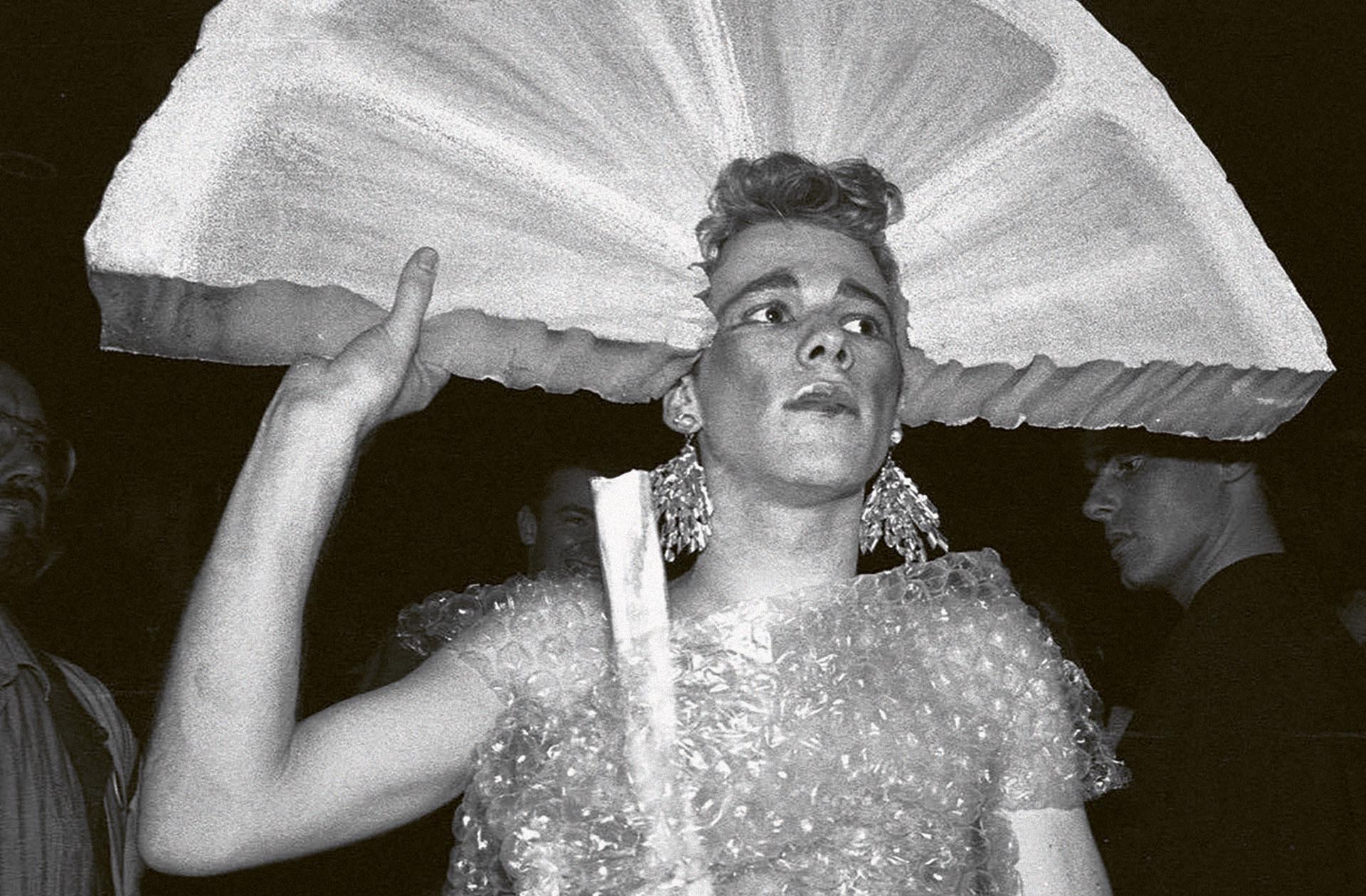With Peter Dunne and Stefano Pappalardo talks Mariusz Godlejewski
Image above, Hirschfeld Centre, Dublin 1979 (photo from GCN archive)
The year 1969 is considered as the beginning of the world LGBTQ + movement, started by the riots resulting from the police entering the famous Stonewall Inn in New York. The wave of emancipation of the queer community movement has spread throughout the world since then, and its amplitude grows each time more communities join the movement and vocalize: enough is enough. Rebellion and anger are two emotions that can give birth to something new, different, at first incomprehensible or strange, and even beautiful – pride. How does the queer movement that had its Stonewall 40 years ago look today? A successful movement that looks proudly to the future. This topic, among other things, I discuss with Peter Dunne and Stefano Pappalardo, two representatives of the GCN (Gay Community News) magazine, a free, printed LGBTQ + magazine published in Dublin (Ireland) for the last 34 years. We meet in June in the heart of this city, 4 days before the Dublin Pride Parade 2022 and just after the release of the GCN special issue for the Pride season.
Mariusz Godlejewski: The GCN Special Pride Issue is 130 pages. What can we find in it?
Peter Dunne: We are Ireland’s national queer press, and we are not just for one section of a community, so we must make sure that everybody feels represented. We ask ourselves: are we talking about things that affect the trans community, are we talking about things that affect the lesbian community? And we must make sure that everyone is there. If you’re going to advertise yourself as the country’s national queer press, you want everyone to see themselves there because if you don’t see yourself represented, especially in the Pride issue, what have you got? You’re possibly not going to see yourself represented anywhere else. There’s an awful lot of fun stuff, beautiful images; but we must always remember that pride is a protest. On the cover you will find two guys who present a comedy podcast called ‘I’m Grand Mam’, but we also asked them important questions. Do you feel safer in your country? They live in London, so we ask them Do you notice differences between how the queer community is treated here and in London? Without being too heavy handed, we try and make sure that we’re still talking about issues that matter. We’re not going to gloss over it. Because it’s a Pride issue, you might get a lot of companies that might want to do rainbow washing1 and make sure they have their ads in there. Everyone just wants to be seen supporting the queer community in Pride. But also, if they’re going to be picking up the magazine to see their ads in there, they’re also going to be seeing what the community is talking about right now, what’s important to us and, if you’re really going to be an ally, these are the things that you must be supporting us on as well. We want to make sure that we’re giving space to platform voices, so we are open to the community coming to us and saying: what are the things that are important for the queer community? It is a team effort, it’s not just me and Stefano. Anyone can e-mail us. We make great relationships with writers who come in and do placements or volunteer. That’s also a great way of connecting with the next generation of queer voices that are coming up.
1Rainbow washing – The act of using or adding rainbow colors and / or images to advertisements, clothing, accessories, etc. to indicate progressive support for LGBTQ + equality and win the favor of consumers with minimal effort or a pragmatic outcome.
Stefano Pappalardo: We want to nurture the future audience as well. We want to make sure that it’s not just our generation that feels represented. Often, we establish long relationships with people that have just pitched us an idea, whether it’s for the magazine or for online purposes as well.
PD: It’s good to have Stefano who looks after the digital side because even though we have a nationwide distribution, there could be some places where you can’t pick up a physical copy. And there is still the case that there are some people who wouldn’t feel safe being out and they’d be worried about being found with a physical copy.
MG: It is one of the reasons we wanted to establish NE_NI as well. To have this free access. So especially young people can bring that home, leave it on the coffee table and start a conversation with parents for example.
SP: GCN has always been focused on the community, but a lot of magazines are news outlets. We have recently seen a kind of rebranding because they’re like: okay, we can’t talk just about gay men. I have seen some outlets that were very male and now they’re completely changing their trajectory. They’re more aware now that you can’t just be focusing on one. There are still some magazines just for gay men and that’s fine. We are planning the content, so it is a constant conversation that we have with our community. During the pandemic our aim was to educate, to inform and to connect our community
PD: The big thing is the accessibility. It is free because we want to make sure everybody gets it. Many people would have stories when they first saw GCN, they would be sneaking it home, sneaking it into their bag, it was kind of a secret thing. But if they would have had to go up and buy it, they wouldn’t. They wouldn’t have the nerve, you know. And that’s why accessibility is so important.
SP: During the lockdown we understood that many people were isolated, especially the queer youth who could be in an environment at home where they did not feel safe. We had to produce a lot of online and digital initiatives – especially since the magazine was paused – to give them a kind of hope.
PD: It was surprising even for us to find out how many people still weren’t out considering we are in a country that has made such leaps and bounds. There were so many people that just weren’t able to be comfortable with who they were. It was sad.
MG: You put a heavy accent on the community. If you could describe, going back to the early days of GCN, how you reported the news and what was happening to the community? If you could tell us what are the milestones of the Irish road to equality and where we are now?
PD: GCN started before homosexuality was decriminalised so we were still illegal at that time. To be fighting for rights or to be complaining about treatment when you were illegal, that took some nerves, to say the least.
SP: GCN also lead in terms of social change not because homosexuality was decriminalised but because, as printed press, the GCN was a voice. It put pressure when it was time to make changes in the law and in the constitution. The GCN roots are deep into activism and social change.
PD: For a long time, we were the only voice. So, decriminalisation was the big matter for the community in general. Before the decriminalisation, it was the Declan Flynn murder in Fairview Park that really galvanised a movement.
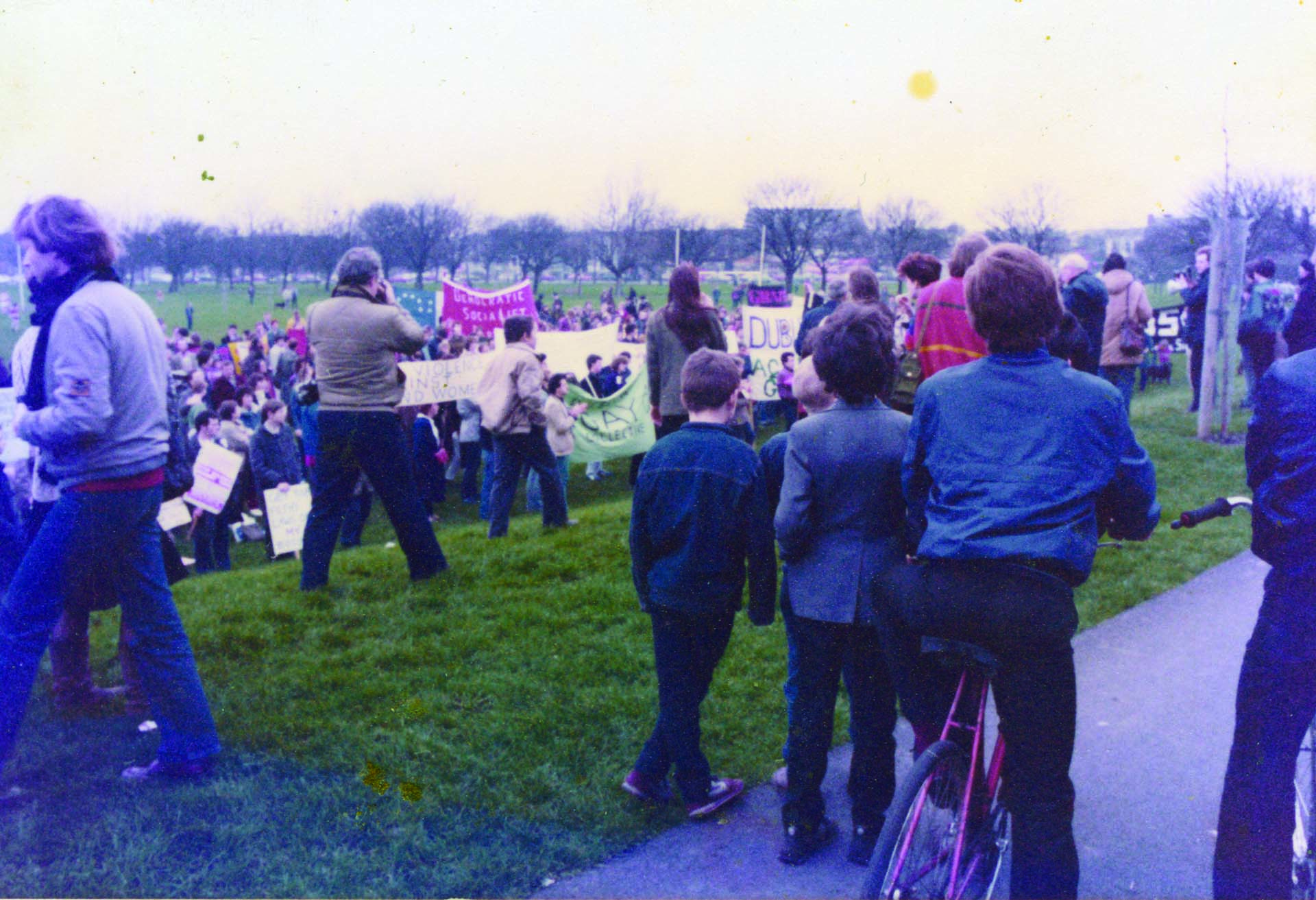
MG: Let’s talk about that because in a way it feels like the history made a circle. The Declan Flynn murder galvanised the movement as you say. The first March happened because of this crime. Now we again experienced murders and we had attacks in the city centre. If you can take us back to 1982, what happened in Fairview Park?
PD: It was a group of young men, children actually, and teenagers. They had decided that they were going to clear Fairview Park of what they would call steamers2 which was a derogatory term they used for gay people. There were different reports of just how they interacted but basically, they beat him so severely that he died. The people that did that were let away with a slap on the wrist. When the young men got off with it3 there was a party atmosphere. There was almost a celebration.
2the offensive term for gays
3Judge Gannon in the statement of reasons for the verdict said, “One thing that occurred to me is that there is no element of correction required here. You all come from good homes, with experienced care and affection. ”.
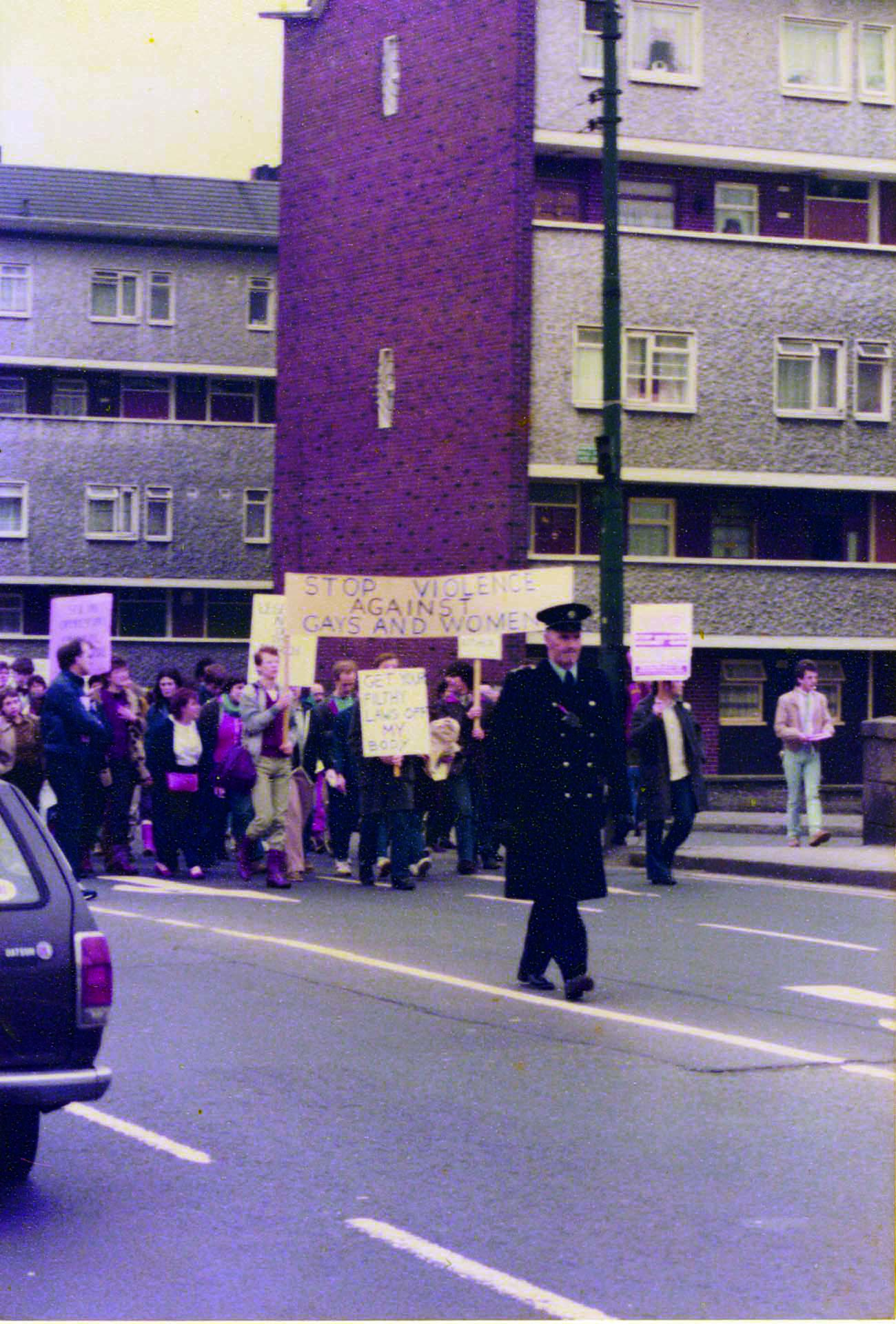
SP: The press as well. The community didn’t feel it was a big deal for anybody else but for the queer communities. There was a lot of anger.
PD: And it felt like those queer lives could be thrown away. The feminist movement and even the trade union movement got involved as well. All these people came together for the first March, and it was the Irish Stonewall moment in a way. People were so furious. It was that anger and sense that your life is worthless that just moved people into doing the first March4. That was the beginning of the modern Pride movement in Ireland. That energy kept up. That’s when more people would be open about their sexuality, what started small got successively bigger with each parade, with more people coming out into the street. It was that kind of anger that turned into bravery that turned into aspiration that just kept on building up.
4150 people took part in the first Dublin march in 1993.
SP: That was the tipping point for the gay rights movement in Ireland. The common sentiment was: enough is enough and we can’t let this happen again.
PD: There was a centre in Temple Bar5 called the Hirschfield Centre where the queer community would gather and talk. After the Declan Flynn murder people would be walking past the door again and again trying to build the courage to walk in or just making sure nobody was looking and then just run in. That also became victim of a mystery fire and was burned down.
5An iconic district in Dublin City Center.
SP: That was the first time the printing of GCN had to be paused because that’s where it was. In the centre they had this kind of coding – the pink triangle – so that if you were a queer person, you know that was clear space and it was safe to go here. That was very subtle. If you were queer, you would know that was a safe space but if you weren’t, you just wouldn’t know that.
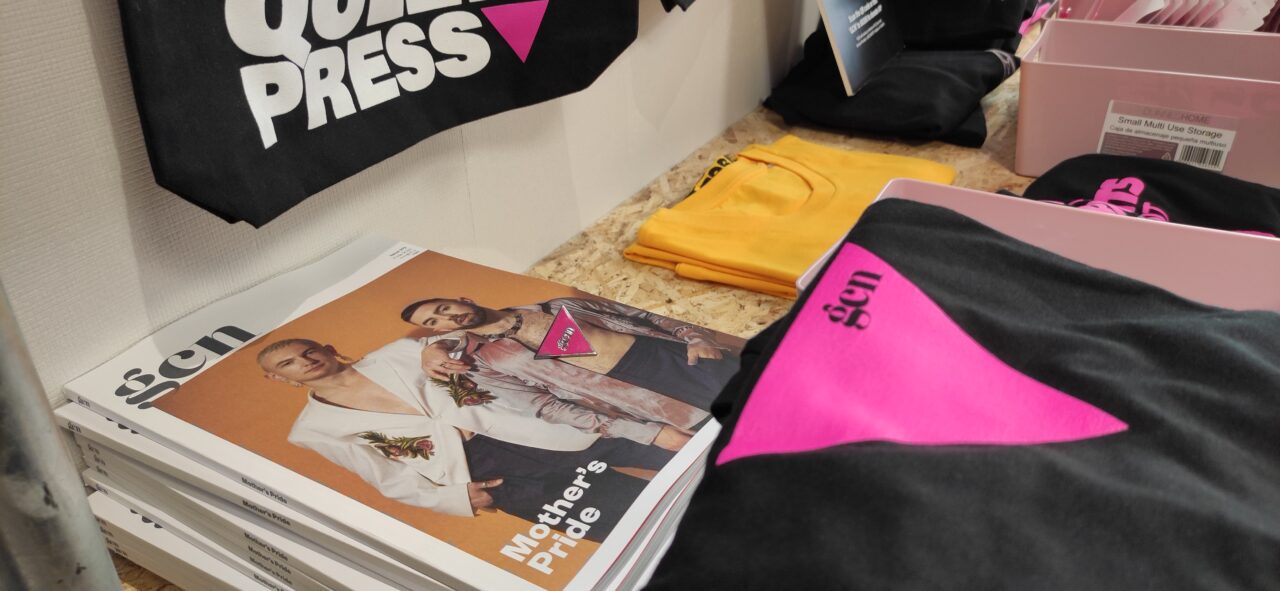
MG: Let’s stop at the symbolism of the pink triangle. You said that it’s a sign that people not from the community would understand or know what it means. In NE_NI #2 there’s an interview with Piotr Chruścielski, the organiser of the very first exhibition about the prisoners in the concentration camps marked with a pink triangle. So in Poland the pink triangle has this heavy symbolism, it’s talking about the past and it comes with a kind of a burden. Not everyone from the community agrees to using it as a symbol of the movement. The GCN is using the pink triangle on T-shirts, on merchandise, you have it in your magazine. What does it mean to you in 2022? What does it stand for? What does it mean to the Irish community?
PD: It’s like with the word “queer”. That was a derogatory term in Ireland. Even when I was growing up, the thing that you would be called was “queer” and it was such a dirty word. Now I would identify as queer, not gay. It’s the reclaiming process. So we would use it on the website, in the magazine, but sometimes members of the public would contact us and say, “I’m not comfortable with you using this phrase”. Same with the “LGBT+” that we use. We would have community members contacting us going “It would really help me if you had “LGBTQ+”. So, it can be a divisive issue for sure. The reason here is that the pink triangle is what you would once use to brand us or put us down. We are proudly saying: this is who we are. It’s to push away the shame. If that triangle was put on people to shame them, we are going: not here it isn’t. We are not ashamed of who we are. You might have tried to use it for that but we’re not taking it as a stamp. We are taking it as a badge of honour. That’s why we are really trying to incorporate it into our branding.
SP: It’s not for everybody. Some people might still find it triggering but it is an iconography that we reclaimed. It’s not erasing what it meant in the past. It is acknowledging it. But it’s also a process of reclaiming something that was used to brand us or to put us down and is now used to empower us.
MG: You talk about the anger after Declan Flynn’s murder and the pink triangle as a badge of honour. Two emotions: anger and pride. So, I want to ask you about the marriage referendum and the campaign around it, because it generated a lot of emotions, a lot of energy. I’m going to quote something from the GCN Pride Issue, page thirty: “Same sex marriage is still a more difficult future to imagine than a traditional marriage and as we get closer to adulthood, we begin to realise this”. That was Robin Crotty in “Queer conformity”. In the referendum 62% of voters voted for YES, which is a huge number, but it’s close to 50/50 where we are now in Poland. We are almost there, not quite yet. I know how difficult the campaign was. What kind of an effect did it have on the community in that specific moment in time, that nationwide debate, the constitutional panels that the beautiful documentary “The 34th”6 was made to record*. The whole nation voted to change the constitution. What had it done for Irish society? How did it influence the whole thinking about equality and the nation?
6The Polish premiere of the document was presented during the events accompanying the Third Equality March in Toruń in 2019, courtesy of Culture Ireland, the Irish government’s agenda.
PD: Thankfully it was a good result. But at the same time, just as you said earlier, we were putting our rights to the public vote. What if it went the other way?
MG: In one county it did.
PD: Exactly. There was a kind of fear that you were hoping that the public was behind you. But you didn’t know. And then the media were giving equal weight to very extreme views in terms of a balance.
MG: Let’s stop here for a moment. The role of the media in those debates. They had to, because it was a constitutional debate, or they allowed it. I’m asking because you just had a controversy with the national media, the RTE again7.
7Following the scandalous attack on the trans community on the popular radio show Joe Duffy Show.
PD: I would say it’s a mixture of both honestly. I think they had to but also like this is good press. This is kind of getting arguments going. Making it viral because you get more clicks making people angrier. It got to a stage where there were two versions of GCN ready to go out. There was a version for YES and a version for NO. The photoshoot had to look celebratory and also dignified in case of a loss. There was quite a while where we didn’t know. I remember my boyfriend woke me up on the announcement day8 and he said it’s a landslide9. And I asked him: which way? There was a lot of uncertainty. During the campaign, even walking down the streets and seeing these billboards, seeing every child needs a mother and a father. It was incredibly uncomfortable to see. It wasn’t just about marriage. To see your existence or your rights being debated, that could be very upsetting, it was frightening. I was even thinking to myself: if this is a NO, I don’t necessarily want to live here anymore. Even if it’s like 50%, one of every two people passing me on the street is against me. It even made me aware of how I acted in the streets, how I presented, how I was walking. It made me very conscious of myself. But then the day when it came through it was the opposite. When I left my house to go into the city centre, I wanted people to know I was queer. It was a weight lifted off me.
8In Ireland, votes are counted only the day after the closure of polling stations and presented on an ongoing basis when counting from individual local government units. It builds up tension throughout the day of counting votes.
9Loosely translated: a huge advantage in voting.

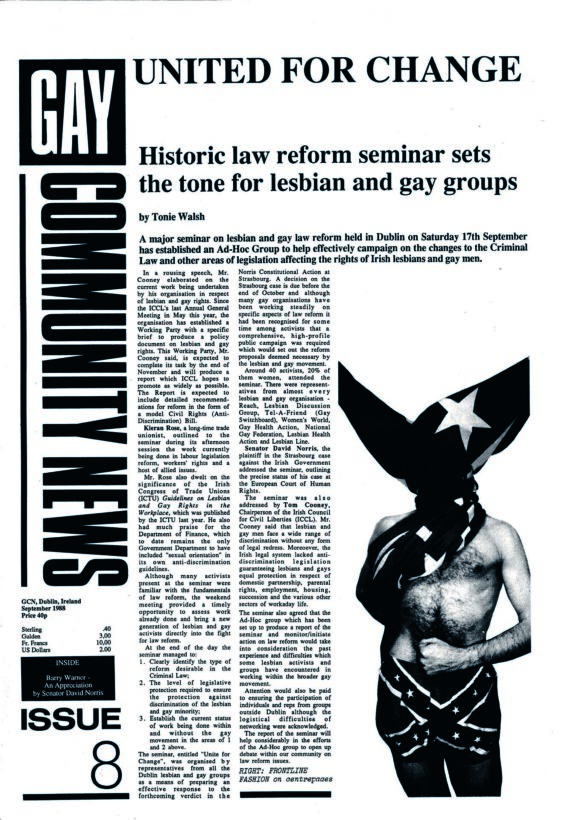
MG: Stefano you did canvasing so share these emotions…
Y: Well, I didn’t cry so much in my entire life as I have in the moments leading up to the referendum, but it was very surreal and very happy that I was able to witness such a moment in history. I am not an Irish citizen so I couldn’t vote. That’s what led me into canvasing and then canvasing led me to apply for the GCN job. I wanted to get more involved. It was very weird because the minority was asking for permission on if they were allowed to have human rights. That was already very weird. And then, on a smaller scale, going canvassing was even more weird. To literally knock-on people’s doors and say can I marry my partner of, at the time, 10 years. It was a very strange moment. There was that fear that: what if it doesn’t go well? I was thinking about going back home because I didn’t want to be in a country that doesn’t welcome you, essentially. Also, the campaign for NO was absolutely disgusting. That’s probably when we started doing canvassing, before that we had to do workshops where they would train us: if it’s a hard NO, don’t waste your time, because that person’s mind is already made up. You can try and talk about it often but if the person is aggressive, don’t waste your time and mental energy. The NO campaign specifically was very warped. I saw that happening. They were purposely spreading misinformation, stuff that was not accurate, stuff that was not the point or wasn’t even included in the referendum at all. Their pushed agenda was surrogacy and legislation for surrogacy which was not covered at all. I was banned from the Iona Institute Facebook page because every time they posted fake news, I would go: this is false! They were purposely spinning the narrative around issues which weren’t part of the conversation. As a non-Irish citizen for me that was the moment when I felt welcome here. I can get married, adopt if I want to, I can tell you that during canvasing emotions were very high because like Peter said, you just didn’t know. It is a signal of a lot of current issues, because at the end of the day you live in your bubble, your friends are not going to be homophobic, not going to be transphobic. It’s hard to tell if my perception is accurate or if it’s just the bubble. That was the first time that, as far as I remember, I was thinking: of course, all my friends are going to vote YES but is it just my bubble? Is it the whole country?
MG: That’s why I’m asking about the debate and marriage referendum because I feel like it had a therapeutic value on the whole nation. As you said, all the crying and the emotions of the debates, you mentioned Iona institutes, in Poland we have an organisation from the same family of organisations, Ordo Iuris, and they’re very strong, very active, pushing their agenda together with the church. Ireland and Poland have a lot of similarities: first, the catholic church. How strong is Iona Institute now? Where are they now after the debate, after what happened, after the role they played here?
PD: They are almost insignificant now.
SP: It’s very small. In Ireland every politician supported the YES vote and then when it passed it kind of completely devoured Iona Institute and similar groups. Now I think what’s being very clear is that the pandemic has taken us a step back. You can’t say I hate gay people now, so those groups use more sophisticated techniques to gently get people to go along with their views. Unfortunately, the recent spike in hate crimes is also partly because of the lockdown.
PD: Because when you can’t gather in a public setting, everyone goes online. There is no censor online and I don’t mean it like a censorious: this is bad or good. You can read what you want to read. But there is a lot of fake news. If you’re not going to meet people and clash with them and have discussions, all you are getting is online. Everyone is sitting at home, doing nothing, sitting in the dark and just all you do is go online and read this stuff, there is nobody telling you any different, which is kind of frightening.
SP: But also, when you are vulnerable because you might have lost your job, you’re worried about your future. There are a lot of vulnerable people. And it’s not making an excuse for them, information is out there; check, test the sources you’ve been reading. A lot of people don’t do that so there are a lot of people that found themselves lying about this without even realising straight away that it is a specific type of agenda. I do think that on the flipside of that, if anything, the recent attacks, it’s a push forward. I feel people are understanding now. We’ve taken some steps back since lockdown so maybe we need to roll up our sleeves again. It just pushes for crime legislation, trans healthcare because the trans community is also under attack on a global scale. It gives me hope that it is not the end of the queer rights movement but there’s more progress that is going to be achieved. For example, Ireland is very resistant to the aggressive TERF movement coming in from the UK. As well the fact that Ireland has a young population compared to other countries like Italy. The flip side of the step back is that people are seeing what is happening and realising that it’s not over, we can not just be complacent.
MG: I’m going to quote here again from the GCN, page 69 Alice Linehan: “pride is necessary as ever as Ireland is experiencing an alarming rise in homophobic violence”. So, this is exactly what you are saying that you managed to have marriage equality, but in a way what I’m sensing from you, is that: OK we achieved something, but we forgot about other aspects of our movement. Let’s talk about hate crime. What is happening? Is Irish society having another debate about hate crime this time?
SP: I feel like the last few months have been a bit harsh. I speak for myself. I do feel there is a wakeup call, a horrible wake up call, because there’s been so many attacks not just in Dublin but all over the country, there’s been more attacks and I think people are now not feeling as safe as they did on the day of the referendum.
MG: Safety. That’s what the marriage referendum gave us as you said. I had the same feeling straight after the vote.
SP: I think as a community we know that the majority is still supporting us. I am confident to say that…
MG: Do you measure the statistics? Do you have polls showing the level of acceptance? Every now and then in Poland there’s a media outlet or an organisation showing polls and every half a percent change is big news. After the referendum do you follow that? Do you measure it?
PD: Not so much, because I think that, as I said, one of the big problems is people didn’t think there was anything to measure until something big like this happens. They see problems only now. I think people were trying to hide their heads in the sand a little bit.
SP: Tinder did a lot of surveys on the mental health of queer people and found a rapid decline during the pandemic, especially people who lived alone or shared their flats. So there was extensive service done on this topic. On GCN social media there is a sense that we don’t feel as safe and protected as pre-pandemic. I do believe that this has something to do with it. Also, Brexit and a lot of far-right parties like in Italy. When you see somebody like Trump being elected a lot of people feel legitimised to scream their opinion, it feels justified. It does have a massive ripple effect.
MG: And there’s no far right here in Ireland right now.
SP: Not really. It’s not nearly on the same scale, however, I do think that there are people being enticed by the international movements.
PD: We are importing a lot of stuff. For instance, I was in America and I was talking to this lady who lived in Nashville, and she was saying that she has a queer child but she’s saying that their child had a great life until now. She said that ever since Trump came into power, their life is hell because wherever she was going, now people tell you what they think about you. Before you wouldn’t know. They probably smiled at you and were quiet so her child would never be bothered. But now people feel empowered to tell you exactly what they think about you. It feels like it’s their right to tell you what they think. Similarly with the TERF movement. It was big in the USA and the UK, and it seems that we are getting it here now and I do think it’s also because of certain media. So, things like RTE and the Joe Duffy show where they had three days of anti-trans coverage on the biggest phone-in radio show in the country. Three days consecutively, not just one little segment. They’re bringing the argument in. Two years ago, in Ireland nobody cared (in a good way) whether you are trans or not, not even bothered about it. And now it’s part of the national conversation. And it is our media bringing it in and talking about it, but I do feel like we are importing arguments from different countries and I do blame the media a lot for it.
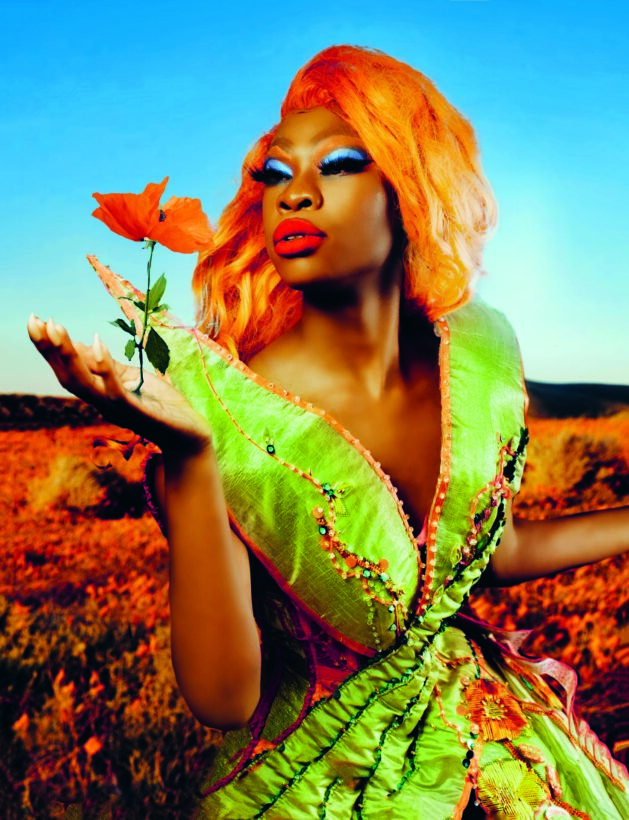
MG: In Poland we have this issue that the current government and the national media, which is a propaganda tool for the government, has completely taken over and is spreading hate. In Ireland the Minister for Justice is talking about the importance of the hate crime legislation that will be put up to a vote. Where’s the education element in the debate? How does it look in your school system? Do you have lessons about equality, gender rights?
PD: We do to a point. Still, the Catholic Church has a bit of control over schools, because most Irish people go to schools run by, for example, the Christian Brothers10. So there are still a lot of schools that are very “I’m not open to speaking about it”. It’s changing in that it is becoming more of a part of the curriculum. But I don’t think anyone else is discussing hate crimes or when it comes to trans rights.
10Worldwide religious community within the Catholic Church, founded by Edmund Rice. Their first school opened in Waterford, Ireland, in 1802. Source: https://upwikipl.top/wiki/congregation_of_christian_brothers, 09/07/2022
SP: It’s better than it was. Until a few years ago there was a baptism barrier11 which was now removed. Now every time there is a questionable assignment or material in public schools, they are called out and it makes the headlines, not just in queer media but also in the mainstream media. People get outraged at that. They had to take a step back. It improved but it’s not as weak as probably it should be, that’s the main thing. That’s how you change society – through education. If you are not going to change the curriculum you are not going to change society.
11Church-run schools admitted only baptized children
PD: We would have talks with queer teachers some of whom I would have interviewed personally – one person said that after she married her wife, she wouldn’t go back into the closet. She knew that if she was to be open about their sexuality, she would end up transferring away to a nondenominational school. There is still a sizable percentage of teachers who don’t feel comfortable being open about sexuality. The good thing is that the Irish people are good at complaining and giving out.
SP: I was going to say passion! [all laugh] I think there is some sense of fairness. If you think that society is not fair, I do think that Ireland is very active at saying that’s not OK. Again, I compare it to how things are in Italy. I think the size, the demographic which is younger helps. Ireland made more changes in the 17 years that I have been here than Italy has made since I was born. It’s mind-blowing. It’s a positive thing.
MG: That’s the phenomenon. Hence the questions I’m asking you to find the source of that.
SP: So many people came out. I don’t think it’s fair you have to put all your personal experience. I think it’s very brave. In the utopian world you should not have to. But so many people spoke out about their experiences and that had an impact on overall perception of it all. If people weren’t so outspoken about it?
PD: This is just my opinion, but I do think it has an awful lot to do with the fact that for so long the Catholic Church held us by the scruff of the neck and we didn’t speak about it. The Magdalene Laundries12 where people were enslaved, and people were ashamed. If you were gay, you left the country. Forget ever being open about being trans. We were so wounded by the Catholic Church for so long. I do think it kind of reached the point where NO, enough is enough. That carried over in the national consciousness. Even things like the water charges13, NO… enough. Having been under the boot of that for so long that now we just push back against a lot of things. When we started getting free from the church, a number of things just changed. We have got a bit of that now: OK, what’s next… no, no more.
12The Madeleine Sisters – Most of the inhabitants required hard physical work, mainly in laundries, so in Ireland the asyliums were commonly referred to as “madeleines’ laundries”. During the 150-year history of the asylum, this institution has welcomed around 30,000 women, often against their will. The last asylum was closed on September 25, 1996 in Ireland. The Irish government has issued a special statement apologizing for abuses in asylum and mobilizing a fund to help victims. The Catholic Church refused to contribute to this fund.
13The IMF ordered the introduction of water bills as part of the country’s budget recovery program after the 2008-financed crisis. In Ireland, this was met with massive protests and led to the establishment of the Right2Water peaceful movement.
SP: I always say to my partner or my Irish friends: you should be very proud cause it is remarkable. Italy was and still is very much controlled by the Catholic Church. We had the same scandals as Ireland has had, but it didn’t get the same reaction “things do need to change now”.
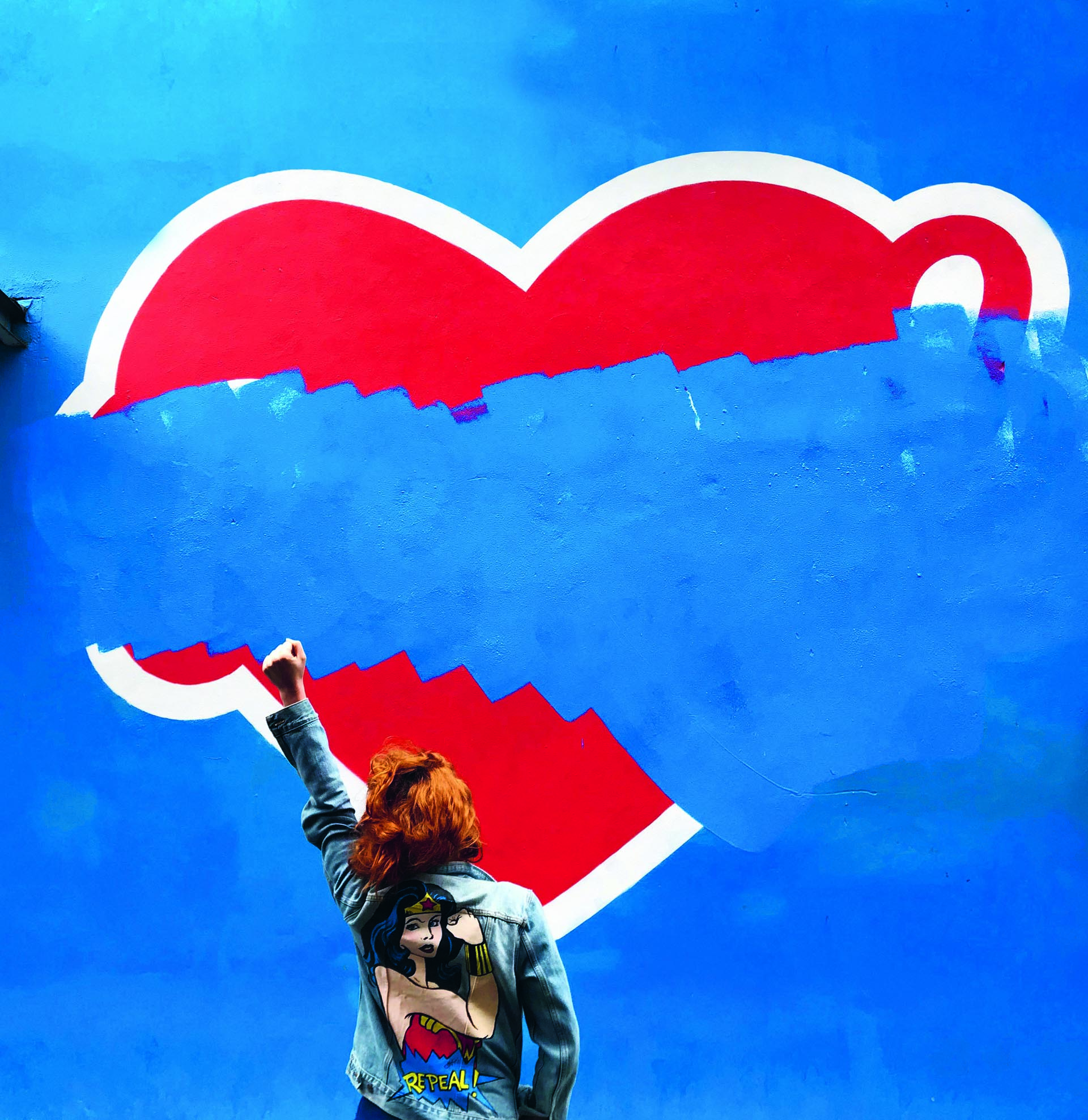
MG: After the marriage referendum you had the “repeal the 8th” movement. In Poland women have no right to abortion really. The current government made changes in the law, so this is a difficult debate now in Poland. How do you work together with other organisations? What society as a whole and different groups: families, woman, gay, trans, climate activist want to achieve for the society, for your communities?
PD: If you think about the “Repeal the 8th” that was another thing that was really a victim of the Catholic Church. There was a real sense of solidarity between us, like it is kind of unusual if you think of it in a way that even though there is a lot of queer people who couldn’t get pregnant to see how passionate the queer movements were about the repeal the 8th also. There’s a lot of intersection between the people who are affected. While it’s not necessarily just a queer issue, it became an issue for us all. It was solidarity. We’re fighting for each other but we’re all fighting for fairness. Not to bring it up again but the water charges weren’t an issue for everybody, it became an issue for society. It’s a question of what is fair, what’s the next thing?
SP: There were a lot of activists in the repeal the 8th movement who also happened to be queer, so it also helped. There is a sense of fairness and what is fair. In Ireland there are a lot of different groups, different strands of activists who often realise that it is not just my issue or your issue. This impacts other people who might be at the intersection of both movements and so we need to work together. I have seen it with the “Repeal the 8th” movement, with environmental issues, so there are a lot of opportunities for different strands of activism to work together to reach a common goal. In Ireland there is very much a deep understanding that the “Repeal the 8th“ it was not just for straight women, also a lot of gay women, the environmentalists as well.
PD: There’s a big change in the country, even politically. Forever it was always Fine Gael, Fianna Fail, and they would swap back and forth leading the government. Just recently was the first time ever that Sinn Fein were in front because people kind of said: we’ve had enough of the same thing again. In terms of what’s next, I think the housing crisis without a doubt. Like most of the world, the cost of living is going to take people’s attention.
SP: The protest started before the quarantine, before Covid. That was already a hot topic back then, and then two years kind of went by, things were on hold. But I remember just the year before the pandemic, there were so many demonstration protests for the housing crisis. So, it is the next issue.
PD: As far as what queer community can argue for, a lot of energy is going to be placed under the housing crisis. I don’t know if there’s a queer issue that’s going to have the space to focus on. It would probably be hate crimes. It is terrible but like with the Declan Flynn’s murder, you need something horrible capturing the public’s attention to push things forward. Which is unfortunate but that’s kind of the way it works. Those recent horrific murders, it captured people’s attention, galvanised the debate. Things that we really need to be worried about and concerned about are trans rights, trans healthcare…. because it’s a joke in Ireland.
MG: In Poland if you want to change your gender, if you’re trans, you need to sue your parents first. That’s the conversation we are having in Poland as well.
SP: It’s a far-right tactic to demonise a very small group of people like the trans community. Just make them the enemy, make them the topic of public attention, the hot topic, the debate.
PD: We reported on it yesterday, the international swimming association banned transwomen competing in swimming sports. Today it was the rugby league that banned transwomen competing in rugby sports. It’s frightening how quickly those things are happening. Because of the cost of living that’s where the public is concentrating while all those other things are slowly being eroded underneath. As a queer press, we are worried. We would publish stories about trans people and sometimes the comments on social media are upsetting.
SP: …those are the stories you need to monitor a bit closer because of comments. Again, a very basic tactic of the far right: divide us. The community in Ireland at least is closer. In Italy the national lesbian organisation is now fully TERF. It is insane. It’s not the case in Ireland where the majority of the community is supporting trans rights. It’s easier to dilute the movement if you have a community that’s fragmented.
MG: The same tactics in Poland. The ruling party is so bad at ruling, they made a lot of mistakes, lots of corruption, they are using the conversation about the trans, LGBTQ+ community, gay rights, migrants… You were talking about the housing crisis. In Poland now, we have 3 million refugees from Ukraine. I know you have around 35,000 Ukrainian refugees in Ireland. Do you have any contacts with LGBTQ+ refugees in Ireland? Are they here?
SP: Not specifically Ukrainian, but there are groups typically. The direct provision was a big thing we worked on often with activists.
MG: What is the direct provision? If you can explain it to our readers.
PD: Very crudely, it was a processing situation. When you come into Ireland as a refugee, you’re put into a system where you are supposed to be until they decide whether to accept your case or not. What was happening with people is that they were trapped in the system for years. There were children growing up in the system. While you were there, you were put into hotels, you were living in an old holiday camp, people put into the chalets there, you were given very basic money to live on, you had to eat food which you were given, you couldn’t work, and you had to report back to this place. What was happening with it as well is that queer people who were fleeing their countries because of homophobic or transphobic persecution were being put into centres with the same people that they were running away from. You’re literally trapped with the people that you were trying to get away from. You could be in the system for years with no sense for the future. When you think about the impact on your mental health, you feel like there is just no escape. That was kind of a national shame. GCN was a big opponent.
SP: It was supposed to be a temporary solution that the government created while figuring out a better solution, it’s taken years and years.
PD: There is talk it’s going to be dismantled. I think by 2024, that’s the plan and they said they’ll introduce a different way of dealing with it. We accepted some people from Ukraine, as we should have, but then people are going: it is just white skinned people that we’re accepting. But then if there’s people fleeing other war zones there’s a question mark.
SP: It’s the same in Italy. It is the right spectrum of politicians that made a very good job of making migrants the Public Enemy number one of Italy. What happened now is people are highlighting: why is Italy taking in Ukrainians? However, if they are not white, it’s a completely different story. It’s like you’re not welcome. In Ireland there was an issue with queer migrants specifically because you had to prove that you are queer.
MG: How do you prove you are queer?
SP: My best friend works for an organisation and people are so desperate that they would contact him and send videos of them having sex with the same sex partner just to prove that they are queer because there is no real proof and people have been turned away. Because you’re like a gay man or they question what your music taste is. It’s so outdated.
PD: We had a series where in each magazine we would feature somebody in direct provision. Because there’s kind of no point in talking about somebody, we let them talk about themselves. That’s something that we always say, that we are platforming voices. It’s kind of an old phrase: nothing about us, without us. So let the people who are being affected by it talk about it. In every issue we had somebody in the situation talking about this situation to get more people in turn talking about it. It’s a horrible phrase to us but it’s to “humanise statistics”. If you just see numbers, it’s like: oh God that’s awful. But every number is a person and a person’s story.
MG: The last question. What is next for GCN? What are you working on now and what do you want to do in the next issue?
PD: One of the things that we are celebrating is the fact that we can get back into the live space. We like connecting with community. While during the pandemic we were connecting them online, now we want it in real life as well. For GCN, we want to try and have more events. To try and get people together again. This is the thing about the far right using our moments of separation to divide ourselves – If I meet you, it is very hard for me to hate you. We want to get queers back together again. As a magazine we want to keep platforming voices. We want to be as inclusive as possible, to make sure that everybody is represented, to make connections like this, you talk about what’s going on in other countries. When you are working together with other people, you are stronger. Let’s import a good idea.
SP: We are based in Dublin, but we are an Irish queer press. We want to try and do more live events that go outside a little bit. For instance, we did the living exhibition …
PD: It was a photography exhibition showing people living with HIV to humanize it, to get rid of the stigma. It wasn’t just gay men, it was straight women, because women with HIV are kind of nearly invisible.
SP: It was hard to find people to have their portrait taken because they also face more stigma and more disinformation.
MG: We had an article about this in NE_NI #2 as well.
PD: We want to keep being the voice for people that don’t feel like they are represented in mainstream media. And to always keep fighting against the things that are attacking the community. So right now, we really must be a voice of the trans community. There are no two ways about it. We really must push ourselves more because they are under the biggest attack right now.

Peter Dunne – the editor of GCN magazine. In collaboration with the GCN team, he plans and writes magazine content and commissions freelance journalists and photographers to create work which educates, connects and entertains the Irish LGBTQ+ community. Peter is proud to be part of an organisation which provides a platform for queer voices and advocates on behalf of the community.
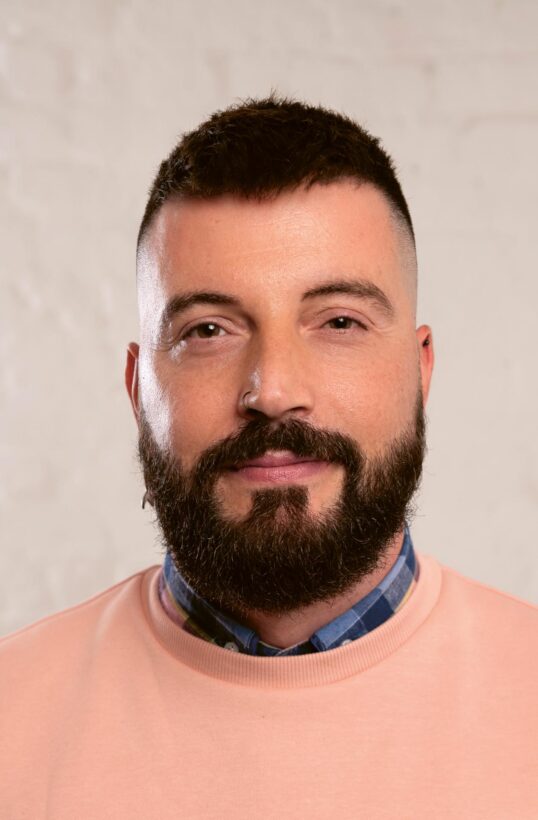
Stefano – the Head of Digital & Marketing for GCN. He joined GCN in 2017, ahead of the relaunch of the print edition and brand new website. Today, he oversees all areas of digital and marketing, planning, commissioning and delivering online content, and supervising GCN’s website. He is also responsible for launching and leading GCN’s first merchandise line and online store. Having been living in Ireland for the past 17 years, Stefano is grateful and proud to be a part of the GCN family, its legacy and advocacy work for the LGBTQ+ community. He loves cats, horror movies, video games, comics and all things nerdy.

